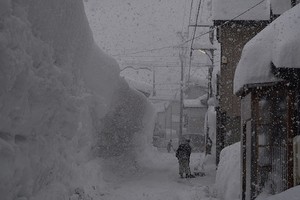July 13, 2021 at 13:17 JST
 Shunzo Morishita, the chairman of the Board of Governors of Japan Broadcasting Corp. (NHK) (Asahi Shimbun file photo)
Shunzo Morishita, the chairman of the Board of Governors of Japan Broadcasting Corp. (NHK) (Asahi Shimbun file photo)
Minutes of a 2018 meeting of the Board of Governors of Japan Broadcasting Corp. (NHK), finally disclosed after months of stonewalling by the public broadcaster, show how its top decision-making body betrayed its own mission.
The board, whose role as representatives of the viewing public is to check NHK’s operations, did a serious disservice to those interests. It clearly does not comprehend the fuss that erupted over its behavior. The document paints a disturbing picture.
The board began acting in a questionable manner after the presidents of three Japan Post group companies filed protests against an NHK program broadcast in April 2018 on inappropriate sales practices by Japan Post Insurance Co. All three presidents later resigned to take responsibility for the scandal involving post office sales of insurance policies to the elderly and others by deploying devious means.
The records of the board meeting include a host of problematic remarks by governors. Both the content of the program and the manner in which NHK collected information for it were “clumsy,” one governor said. It does not make sense to air a program that “tarnishes the image” of Japan Post, argued another.
Some proposed that standards for producing NHK programs and gathering information for them should be created with board involvement.
The board blamed NHK’s governance for Japan Post’s complaints and issued a stern warning in autumn 2018 to Ryoichi Ueda, who was then president of NHK.
The Broadcast Law prohibits governors from interfering in NHK's editorial policies. The board countered criticism about its “intervention” in NHK’s programming by contending the governors only “exchanged opinions and thoughts” about the program for discussions on the issue of governance. The body also maintained it had not instructed “a specific approach to program production.”
These claims are simply a lame excuse. The questionable remarks raised during the meeting show that the governors did nothing but try to find fault with the program from the standpoint of Japan Post. This indicates a complete lack of understanding of the spirit of the law or the role of NHK as a news organization.
It is easy to imagine the effects of the board’s actions. It issued a warning to NHK’s president and instructed him to take “necessary measures” in response to protests from the company NHK was reporting on for potential misconduct. Those actions must have inevitably intimidated not only the staff in charge of the program in question but also the company's entire operation, hindering its efforts to bring truth to viewers.
NHK’s Audit Committee, set up under the Broadcast Law, investigated the public broadcaster’s handling of the issue of Japan Post’s dubious insurance policy sales. The committee concluded there were no flaws in the way NHK dealt with the issue.
The Board of Governors behaved in a manner inconsistent with the committee’s verdict. The board clearly intervened in the program under the pretext of governance in an attempt to cater to the wishes of the Japan Post group, a government-owned corporate group with a close relationship to the Ministry of Internal Affairs and Communications, which supervises NHK.
It is the governance of the board that should be called into question.
The records of the board meeting leave no doubt that Shunzo Morishita, chairman of the board, was among those who led discussions criticizing the program. Asahi Shimbun editorials have argued that Morishita is not qualified to serve on the board. The revelations clearly support this argument.
The Suga administration deserves to be severely criticized for reappointing Morishita in February as a board member with the intention to pick him as chairman.
According to the Broadcast Law, the prime minister can dismiss a member of the board with the consent of the Diet if the individual has violated the obligations of a governor or committed other misconduct.
If Morishita refuses to resign voluntarily, Prime Minister Yoshihide Suga should take this step to rectify his mistake, for which he should be ashamed.
--The Asahi Shimbun, July 13




















A peek through the music industry’s curtain at the producers who harnessed social media to help their idols go global.
A series based on diplomatic documents declassified by Japan’s Foreign Ministry
Here is a collection of first-hand accounts by “hibakusha” atomic bomb survivors.
Cooking experts, chefs and others involved in the field of food introduce their special recipes intertwined with their paths in life.
A series about Japanese-Americans and their memories of World War II